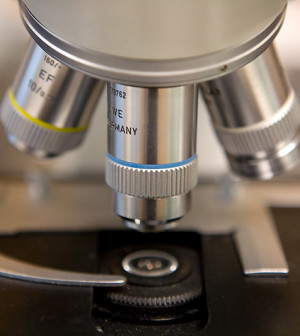- Could Your Grocery Store Meat Be Causing Recurring UTIs?
- Are You Making This Expensive Thermostat Error This Winter?
- Recognizing the Signs of Hypothyroidism
- 10 Strategies to Overcome Insomnia
- Could Artificial Sweeteners Be Aging the Brain Faster?
- Techniques for Soothing Your Nervous System
- Does the Water in Your House Smell Funny? Here’s Why
- Can a Daily Dose of Apple Cider Vinegar Actually Aid Weight Loss?
- 6 Health Beverages That Can Actually Spike Your Blood Sugar
- Treatment Options for Social Anxiety Disorder
New Parkinson’s Gene Identified

Researchers say they’ve identified a gene mutation that could be associated with early onset Parkinson’s disease in white people.
The mutation occurs in a gene that produces dopamine in the brain, and its impact is particularly strong in people younger than 50, according to the Iowa State University researchers.
Rigidity and loss of muscle function in Parkinson’s patients is linked with reduced levels of dopamine in the part of the brain that controls movement, the researchers said. Parkinson’s is a progressive movement disorder that causes tremors and muscle rigidity.
The researchers compared 289 people recently diagnosed with Parkinson’s, but not on medication, and 233 healthy people.
Overall, whites with one mutated version of the guanosine triphosphate cyclohydrolase-1 (GCH1) gene had a 23 percent increased risk of Parkinson’s and developed disease symptoms an average of five years earlier, according to the study findings.
Age made a significant difference. Adults younger than 50 with the gene mutation had a 45 percent higher risk of the disease, while the mutation had a minimal effect on older adults, the study authors said.
The findings didn’t prove that the mutation causes Parkinson’s, just that there was an association. Still, the research might benefit people with a family history of the disease, according to study co-author Auriel Willette, an assistant professor of food science and human nutrition.
“We want to have a more comprehensive understanding of what these genes related to Parkinson’s are doing at different points in someone’s lifetime,” Willette said in a university news release.
“Then, with genetic testing we can determine the risk for illness based on someone’s age, gender, weight and other intervening factors,” he said.
The study will be published in the February issue of the journal Neurobiology of Aging.
More information
The Parkinson’s Disease Foundation has more on Parkinson’s disease.
Source: HealthDay
Copyright © 2026 HealthDay. All rights reserved.










